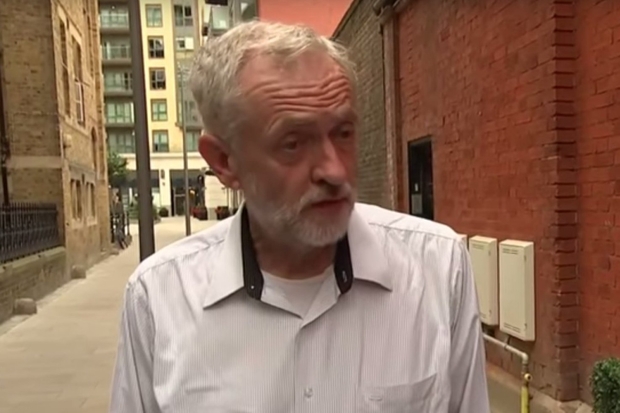On Monday, Jeremy Corbyn was questioned by Channel 4 News about yet another Holocaust denier and anti-Semite of his acquaintance. And now the BBC’s World at One has asked Corbyn about another.
There are plenty more, and this will be able to go on for quite some time. But Corbyn’s defence was interesting in that it went to the heart of the political inequality of our time: that is the assumption that the motivations of the left are good even when they do bad things, while the motivations of their opponents on the right are solely bad even when they do good things.
If you doubt that, imagine the outcry now on the political left if the Conservative party or Ukip looked likely to elect as their leader a man who had spent years working alongside some of the world’s most prominent racists and Holocaust deniers. I imagine there would be some expressions of anger from the left. Indeed I think it would be expressed quite forcefully. There would doubtless be calls to ‘smash the fascists’ and much more. In fact much of the left spent the run-up to this year’s general election, as well as the European elections before them, saying exactly this about Ukip – yet nobody in Ukip to date has had anything like the number of racist and fascist connections that Mr Corbyn does.
But there is something even bigger underneath this, and beneath the Corbyn-ista refusal to face up to their man’s problems. In his interview, the Labour leader-in-waiting regained his breath only once, and that was when talking about Cable Street:
‘My mother stood in Cable Street alongside the Jewish people and the Irish people who were opposing the fascists at that time. We all have a duty to oppose any kind of racism wherever it raises its head, in whatever form it raises its head.’
You could hear in his voice that this is the fuel on which Corbyn and his supporters run when they are running low: the memory of Cable Street, the memory of what Corbyn says was his mother’s role. Of course one irony is that if the battle of Cable Street occurred today it would be Jeremy’s friends who his mum would be opposing (assuming his mother had more moral consistency than her son). But perhaps it is worth letting Corbyn and his supporters know what they are doing at the moment. It is more than trampling on that memory and reserve. They are actually in the process of drying it up.
For years there has been a suspicion that people like Mr Corbyn use ‘racism’ and ‘anti-fascism’ as tools to further their political goals. Amid their overstatements of the problem and the exaggeration of the prevalence and power of these enemies, the suspicion grows that perhaps they don’t really care about it at all and that they are merely means to an end.
Certainly it is clear that Corbyn’s aspirations (‘a duty to oppose any kind of racism wherever it raises its head, in whatever form it raises its head’) is not matched by his actions. Otherwise he would not have spent years palling about with the likes of Paul Eisen, Dyab Abou Jahjah and Raed Saleh. Anymore than he would have welcomed the genocidal anti-Semites of Hezbollah and Hamas as ‘friends’. But the truth is that the left has been running down its ‘anti-racism’ and ‘anti-fascist’ reserves for a long time. Their moral authority on these issues has been dwindling for years, if it was ever there, and if Jeremy Corbyn becomes Labour leader then that authority will run out entirely.
At this stage there probably aren’t many ways to shame or shock a Corbyn supporter over the consequences of this. But let me try one other point, in a language they might understand and might find to be worrying: if you do this then the political right will be able to do whatever it likes. And when it does – whether it is Ukip, the Conservatives or anyone else – you won’t have an anti-racist leg, memory or moral left to stand on.







Comments